10.3 Anthropology Students Respond Back
Now you will hear from 4 cultural anthropology students from Holyoke Community College (HCC) who submitted work in response to the above assignment. These students grappled with the course content, engaged in creative and critical discussion about not only the question of whether anthropology can save the world but also what in the world needs saving.
10.3.1 Nicholas Gentile
Nicholas Gentile, a 2024 HCC graduate, used a newspaper article template to engage with the questions asked by Scheper-Hughes. When I met with Nicholas and the other students whose responses I thought other students would benefit from, I asked him to share his template with the other students to make it more visually appealing for anthropology students to view.
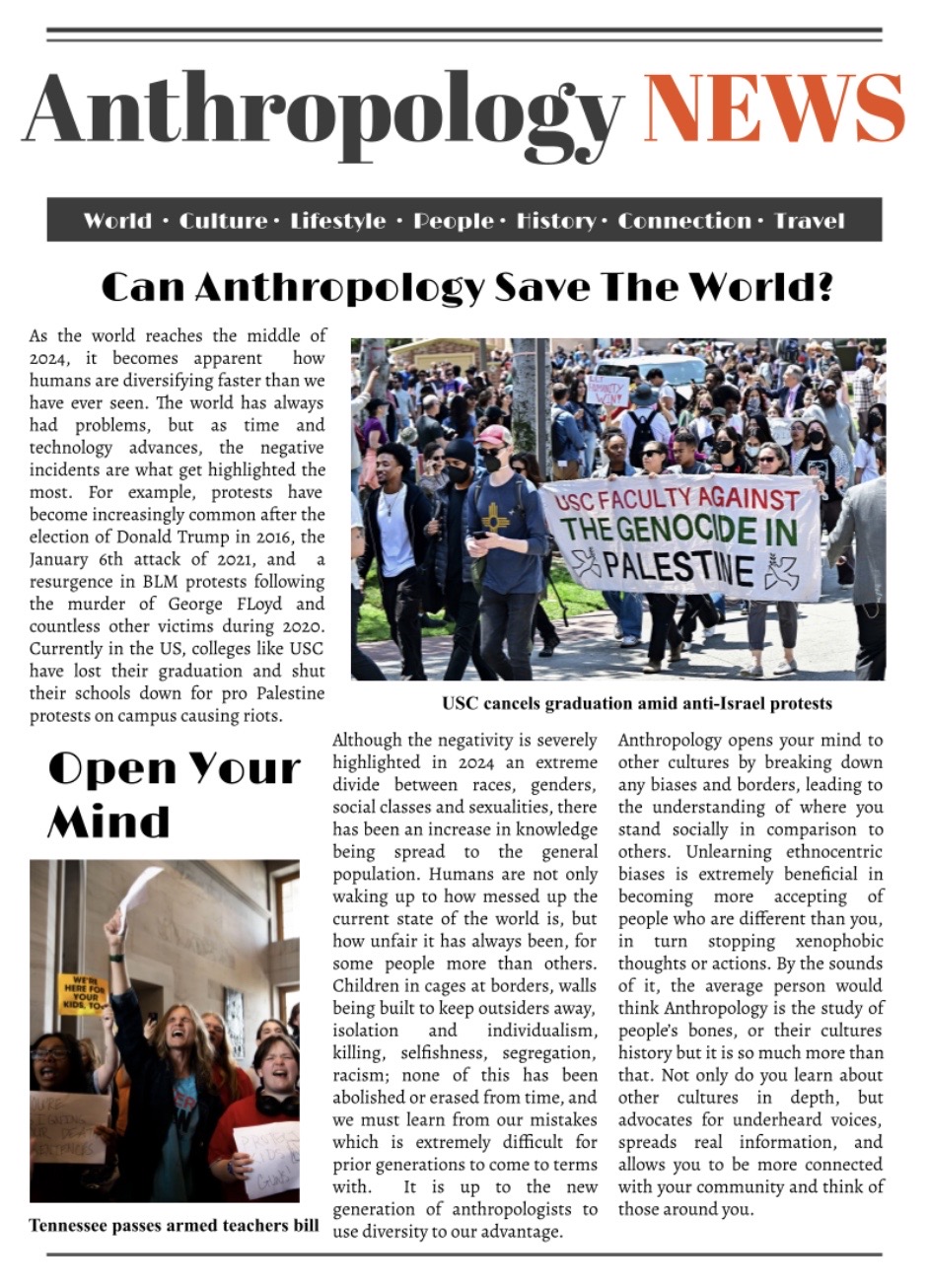
Text Version
Can Anthropology Save The World?
As the world reaches the middle of 2024, it becomes apparent how humans are diversifying faster than we have ever seen. The world has always had problems, but as time and technology advances, the negative incidents are what get highlighted the most. For example, protests have become increasingly common after the election of Donald Trump in 2016, the January 6th attack of 2021, and a resurgence in BLM protests following the murder of George FLoyd and countless other victims during 2020. Currently in the US, colleges like USC , have lost their graduation and shut their schools down for pro Palestine protests on campus causing riots.
Open Your Mind
Although the negativity is severely highlighted in 2024 an extreme divide between races, genders, social classes and sexualities, there has been an increase in knowledge being spread to the general population. Humans are not only waking up to how messed up the current state of the world is, but how unfair it has always been, for some people more than others. Children in cages at borders, walls being built to keep outsiders away, isolation and individualism, killing, selfishness, segregation, racism; none of this has been abolished or erased from time, and we must learn from our mistakes which is extremely difficult for prior generations to come to terms with. It is up to the new generation of anthropologists to use diversity to our advantage.
Anthropology opens your mind to other cultures by breaking down any biases and borders, leading to the understanding of where you stand socially in comparison to others. Unlearning ethnocentric biases is extremely beneficial in becoming more accepting of people who are different than you, in turn stopping xenophobic thoughts or actions. By the sounds of it, the average person would think Anthropology is the study of people’s bones, or their cultures history but it is so much more than that. Not only do you learn about other cultures in depth, but advocates for underheard voices, spreads real information, and allows you to be more connected with your community and think of those around you.
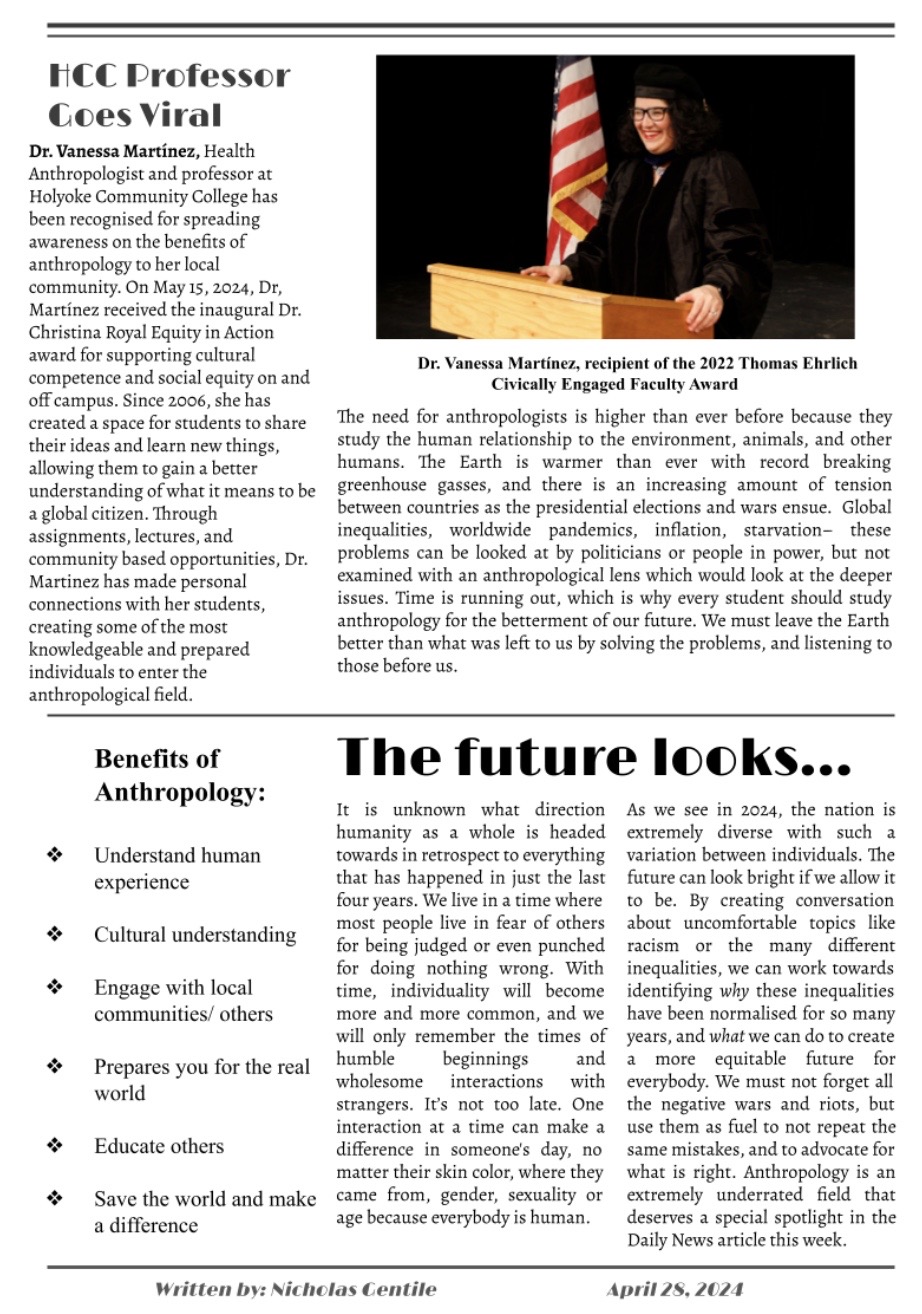
Text Version
HCC Professor Goes Viral
Dr. Vanessa Martinez, Health Anthropologist and professor at Holyoke Community College has been recognized for spreading awareness on the benefits of anthropology to her local community. On May 15, 2024, Dr, Martinez received the inaugural Dr. Christina Royal Equity in Action award for supporting cultural competence and social equity on and off campus. Since 2006, she has created a space for students to share their ideas and learn new things, allowing them to gain a better understanding of what it means to be a global citizen. Through assignments, lectures, and community based opportunities, Dr. Martinez has made personal connections with her students, creating some of the most knowledgeable and prepared individuals to enter the anthropological field.
The need for anthropologists is higher than ever before because they study the human relationship to the environment, animals, and other humans. The Earth is warmer than ever with record breaking greenhouse gasses, and there is an increasing amount of tension between countries as the presidential elections and wars ensue. Global inequalities, worldwide pandemics, inflation, starvation- these problems can be looked at by politicians or people in power, but not examined with an anthropological lens which would look at the deeper issues. Time is running out, which is why every student should study anthropology for the betterment of our future. We must leave the Earth better than what was left to us by solving the problems, and listening to those before us.
Benefits of Anthropology:
- Understand human experience
- Cultural understanding
- Engage with local communities/ others
- Prepares you for the real world
The future looks…
It is unknown what direction humanity as a whole is headed towards in retrospect to everything that has happened in just the last four years. We live in a time where most people live in fear of others for being judged or even punched for doing nothing wrong. With time, individuality will become more and more common, and we will only remember the times of humble beginnings and wholesome interactions with strangers. It’s not too late. One interaction at a time can make a difference in someone’s day, no matter their skin color, where they came from, gender, sexuality or age because everybody is human.
As we see in 2024, the nation is extremely diverse with such a variation between individuals. The future can look bright if we allow it to be. By creating conversation about uncomfortable topics like racism or the many different inequalities, we can work towards identifying why these inequalities have been normalised for so many years, and what we can do to create a more equitable future for everybody. We must not forget all the negative wars and riots, but use them as fuel to not repeat the same mistakes, and to advocate for what is right. Anthropology is an extremely underrated field that deserves a special spotlight in the Daily News article this week.
10.3.2 Xinyan Jiang
Xinyan Jiang, an HCC alum and Amherst College student as of Fall 2024 shares her thoughts in response to Scheper-Hughes below.
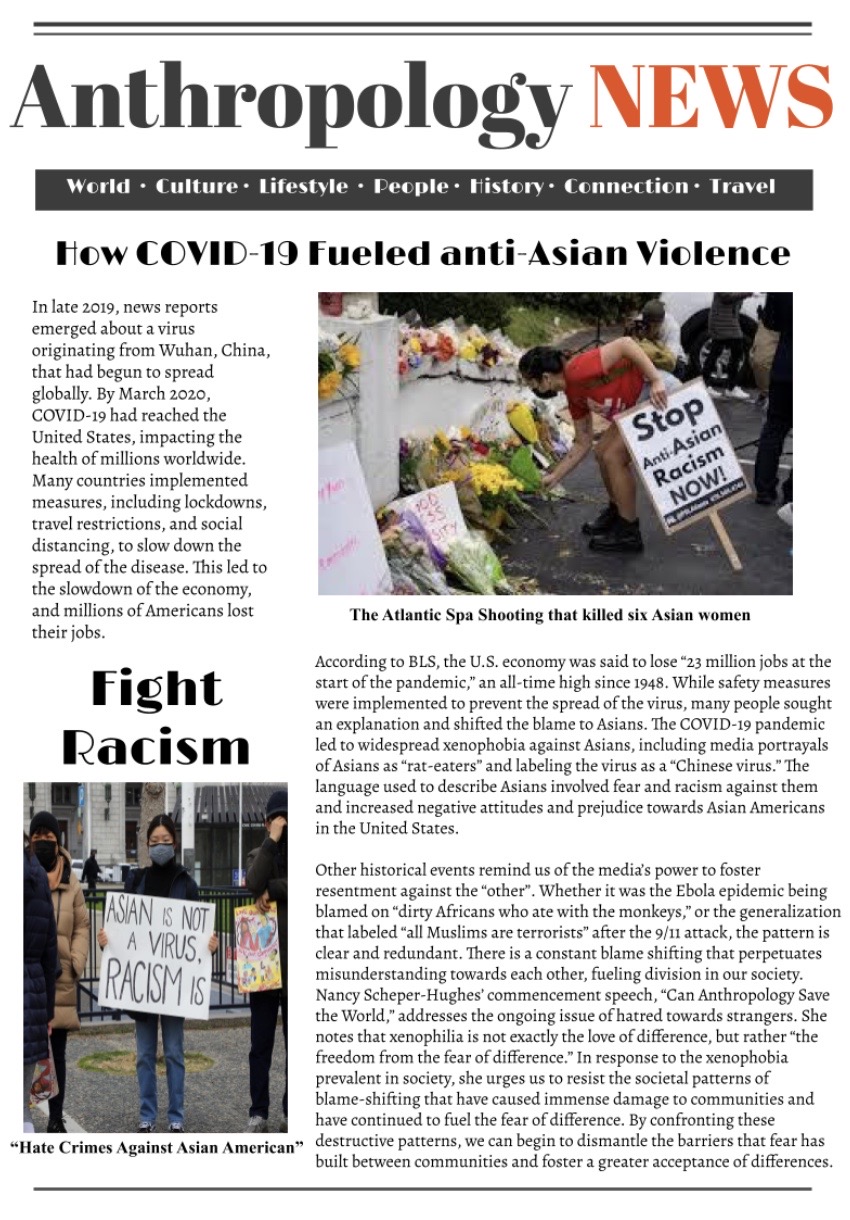
Text Version
How COVID-19 Fueled anti-Asian Violence
In late 2019, news reports emerged about a virus originating from Wuhan, China, that had begun to spread globally. By March 2020, COVID-19 had reached the United States, impacting the health of millions worldwide. Many countries implemented measures, including lockdowns, travel restrictions, and social distancing, to slow down the spread of the disease. This led to the slowdown of the economy, and millions of Americans lost their jobs.
How COVID-19 Fueled anti-Asian Violence
According to BLS, the U.S. economy was said to lose “23 million jobs at the start of the pandemic,” an all-time high since 1948. While safety measures were implemented to prevent the spread of the virus, many people sought an explanation and shifted the blame to Asians. The COVID-19 pandemic led to widespread xenophobia against Asians, including media portrayals of Asians as “rat-eaters” and labeling the virus as a “Chinese virus.” The language used to describe Asians involved fear and racism against them and increased negative attitudes and prejudice towards Asian Americans in the United States.
Other historical events remind us of the media’s power to foster resentment against the “other”. Whether it was the Ebola epidemic being blamed on “dirty Africans who ate with the monkeys,” or the generalization that labeled “all Muslims are terrorists” after the 9/11 attack, the pattern is clear and redundant. There is a constant blame shifting that perpetuates misunderstanding towards each other, fueling division in our society. Nancy Scheper-Hughes’ commencement speech, “Can Anthropology Save the World,” addresses the ongoing issue of hatred towards strangers. She notes that xenophilia is not exactly the love of difference, but rather “the freedom from the fear of difference.” In response to the xenophobia prevalent in society, she urges us to resist the societal patterns of blame-shifting that have caused immense damage to communities and have continued to fuel the fear of difference. By confronting these destructive patterns, we can begin to dismantle the barriers that fear has built between communities and foster a greater acceptance of differences.
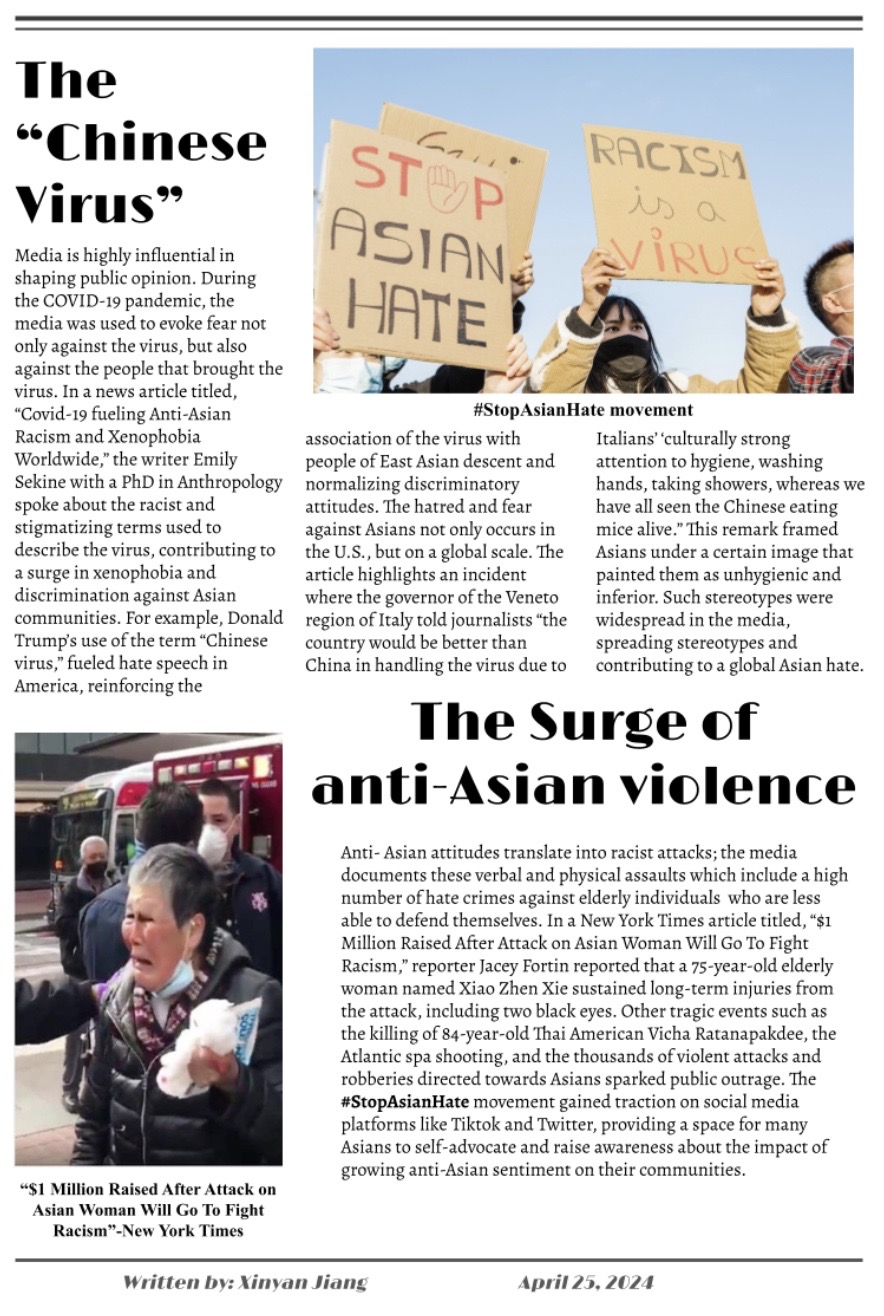
Text Version
The “Chinese Virus”
Media is highly influential in shaping public opinion. During the COVID-19 pandemic, the media was used to evoke fear not only against the virus, but also against the people that brought the virus. In a news article titled, “Covid-19 fueling Anti-Asian Racism and Xenophobia Worldwide,” the writer Emily Sekine with a PhD in Anthropology spoke about the racist and stigmatizing terms used to describe the virus, contributing to a surge in xenophobia and discrimination against Asian communities. For example, Donald Trump’s use of the term “Chinese virus,” fueled hate speech in America, reinforcing the association of the virus with people of East Asian descent and normalizing discriminatory attitudes. The hatred and fear against Asians not only occurs in the U.S., but on a global scale. The article highlights an incident where the governor of the Veneto region of Italy told journalists “the country would be better than China in handling the virus due to Italians’ culturally strong attention to hygiene, washing hands, taking showers, whereas we have all seen the Chinese eating mice alive.” This remark framed Asians under a certain image that painted them as unhygienic and inferior. Such stereotypes were widespread in the media, spreading stereotypes and contributing to a global Asian hate.
The Surge of anti-Asian violence
Anti-Asian attitudes translate into racist attacks; the media documents these verbal and physical assaults which include a high number of hate crimes against elderly individuals who are less able to defend themselves. In a New York Times article titled, “$1 Million Raised After Attack on Asian Woman Will Go To Fight Racism,” reporter Jacey Fortin reported that a 75-year-old elderly woman named Xiao Zhen Xie sustained long-term injuries from the attack, including two black eyes. Other tragic events such as the killing of 84-year-old Thai American Vicha Ratanapakdee, the Atlantic spa shooting, and the thousands of violent attacks and robberies directed towards Asians sparked public outrage. The #StopAsianHate movement gained traction on social media platforms like Tiktok and Twister, providing a space for many Asians to self-advocate and raise awareness about the impact of growing anti-Asian sentiment on their communities.
10.3.3 Adi St.Germaine
Adi St.Germaine, an HCC student and community organizer, responded to this article with a different answer to the question of whether anthropology can save the world. And this perspective needed to be shared with young people like her.
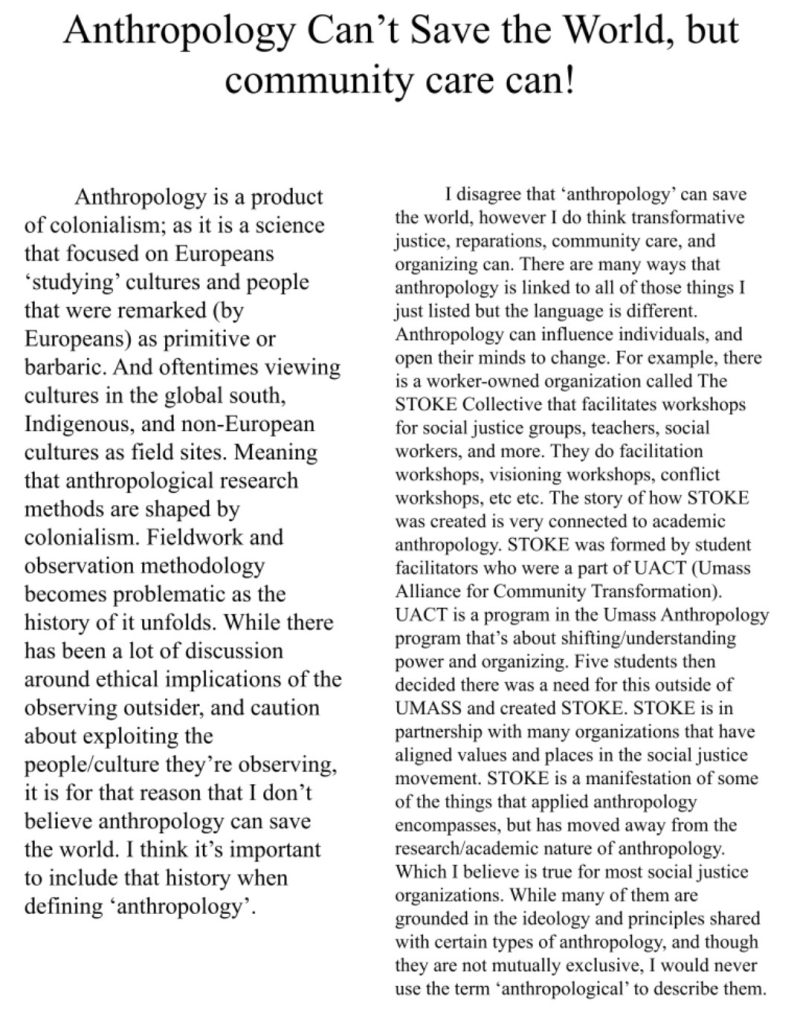
Text Version
Anthropology Can’t Save the World, but community care can!
Anthropology is a product of colonialism; as it is a science that focused on Europeans ‘studying’ cultures and people that were remarked (by Europeans) as primitive or barbaric. And oftentimes viewing cultures in the global south, Indigenous, and non-European cultures as field sites. Meaning that anthropological research methods are shaped by colonialism. Fieldwork and observation methodology becomes problematic as the history of it unfolds. While there has been a lot of discussion around ethical implications of the observing outsider, and caution about exploiting the people/culture they’re observing, it is for that reason that I don’t believe anthropology can save the world. I think it’s important to include that history when defining ‘anthropology’.
I disagree that ‘anthropology’ can save the world, however I do think transformative justice, reparations, community care, and organizing can. There are many ways that anthropology is linked to all of those things I just listed but the language is different.
Anthropology can influence individuals, and open their minds to change. For example, there is a worker-owned organization called The STOKE Collective that facilitates workshops for social justice groups, teachers, social workers, and more. They do facilitation workshops, visioning workshops, conflict workshops, etc etc. The story of how STOKE was created is very connected to academic anthropology. STOKE was formed by student facilitators who were a part of UACT (Umass Alliance for Community Transformation).
UACT is a program in the Umass Anthropology program that’s about shifting/understanding power and organizing. Five students then decided there was a need for this outside of UMASS and created STOKE. STOKE is in partnership with many organizations that have aligned values and places in the social justice movement. STOKE is a manifestation of some of the things that applied anthropology encompasses, but has moved away from the research/academic nature of anthropology.
Which I believe is true for most social justice organizations. While many of them are grounded in the ideology and principles shared with certain types of anthropology, and though they are not mutually exclusive, I would never use the term ‘anthropological to describe them.
10.3.4 Colette Piotrowski
Colette Piotrowski, another HCC student felt strongly that while similar world challenges remain from 2016 to the present, that there is still hope that we can make the world better. See her response below.
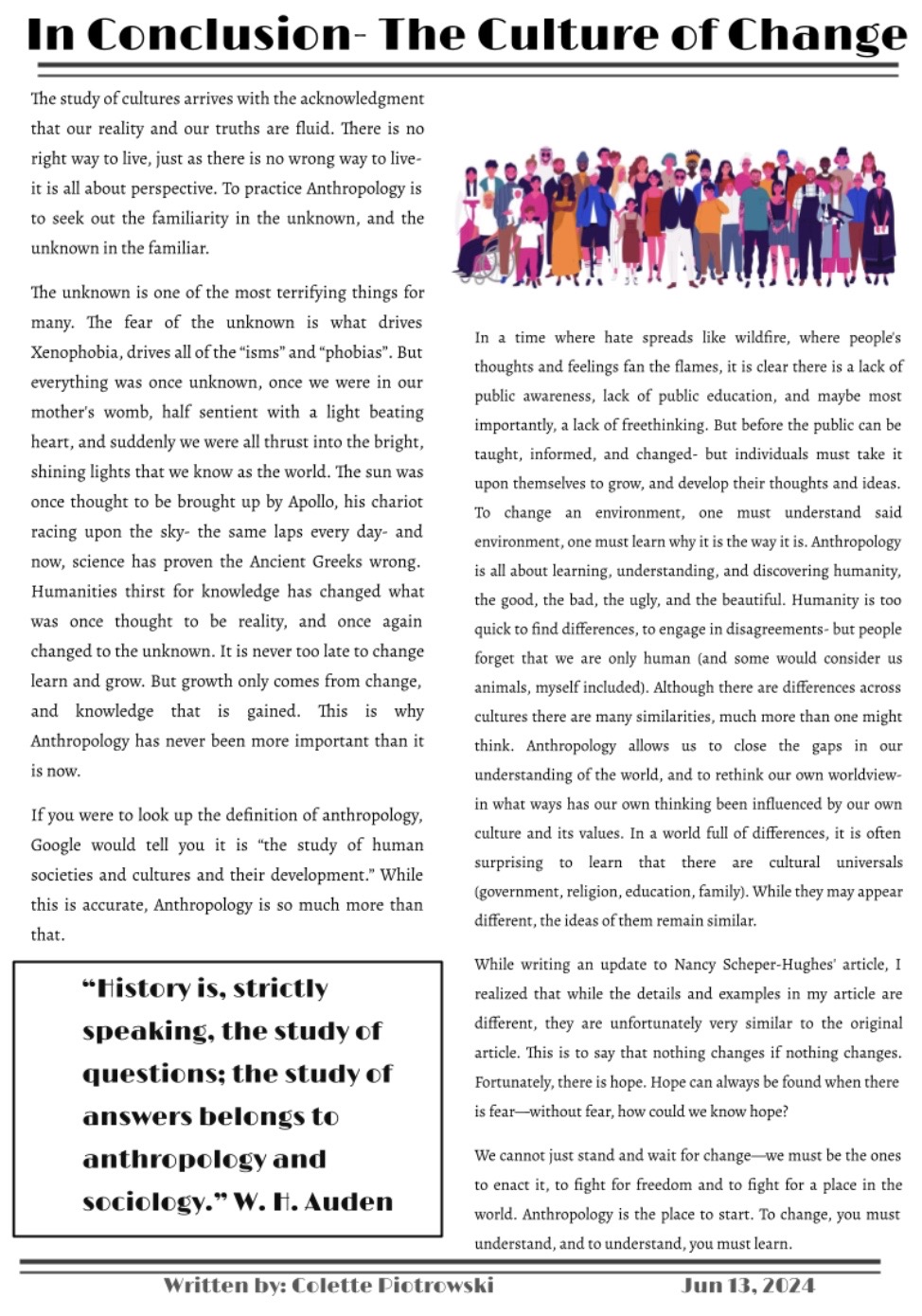
Text Version
In Conclusion- The Culture of Change
The study of cultures arrives with the acknowledgment that our reality and our truths are fluid. There is no right way to live, just as there is no wrong way to live-it is all about perspective. To practice Anthropology is to seek out the familiarity in the unknown, and the unknown in the familiar.
The unknown is one of the most terrifying things for many. The fear of the unknown is what drives Xenophobia, drives all of the “isms” and “phobias”. But everything was once unknown, once we were in our mother’s womb, half sentient with a light beating heart, and suddenly we were all thrust into the bright, shining lights that we know as the world. The sun was once thought to be brought up by Apollo, his chariot racing upon the sky- the same laps every day- and now, science has proven the Ancient Greeks wrong. Humanities thirst for knowledge has changed what was once thought to be reality, and once again changed to the unknown. It is never too late to change learn and grow. But growth only comes from change, and knowledge that is gained. This is why Anthropology has never been more important than it is now.
If you were to look up the definition of anthropology, Google would tell you it is “the study of human societies and cultures and their development.” While this is accurate, Anthropology is so much more than that.
In a time where hate spreads like wildfire, where peoples thoughts and feelings fan the flames, it is clear there is a lack of public awareness, lack of public education, and maybe most importantly, a lack of freethinking. But before the public can be taught, informed, and changed- but individuals must take it upon themselves to grow, and develop their thoughts and ideas. To change an environment, one must understand said environment, one must learn why it is the way it is. Anthropology is all about learning, understanding, and discovering humanity, the good, the bad, the ugly, and the beautiful. Humanity is too quick to find differences, to engage in disagreements- but people forget that we are only human (and some would consider us animals, myself included). Although there are differences across cultures there are many similarities, much more than one might think. Anthropology allows us to close the gaps in our understanding of the world, and to rethink our own worldview-in what ways has our own thinking been influenced by our own culture and its values. In a world full of differences, it is often surprising to learn that there are cultural universals (government, religion, education, family). While they may appear different, the ideas of them remain similar.
While writing an update to Nancy Scheper-Hughes’ article, I realized that while the details and examples in my article are different, they are unfortunately very similar to the original article. This is to say that nothing changes if nothing changes. Fortunately, there is hope. Hope can always be found when there is fear— without fear, how could we know hope?
Written by: Colette Piotrowski June 13, 2024
10.3.5 You Tell Us
Now that you have read anthropologist Dr. Scheper-Hughes and four anthropology students’ responses on current national and global issues, anthropology, and the possibilities for cultural change, what is your take on the assignment? Can Anthropology save the world? Can it help improve communication, understanding, and knowledge about global issues? Can anthropology act as a support to community organizing and government interventions to reduce inequities? YOU TELL US.
Media Attributions
- Anthropology News page 1 © Vanessa Martínez is licensed under a CC BY-SA (Attribution ShareAlike) license
- Anthropology News page 2 © Vanessa Martínez is licensed under a CC BY-SA (Attribution ShareAlike) license
- Anthropology News page 3 © Vanessa Martínez is licensed under a CC BY-SA (Attribution ShareAlike) license
- Anthropology News page 4 © Vanessa Martínez is licensed under a CC BY-SA (Attribution ShareAlike) license
- Anthropology Can’t Save the World screenshot © Vanessa Martínez is licensed under a CC BY-SA (Attribution ShareAlike) license
- Anthropology News page 5 © Vanessa Martínez is licensed under a CC BY-SA (Attribution ShareAlike) license

